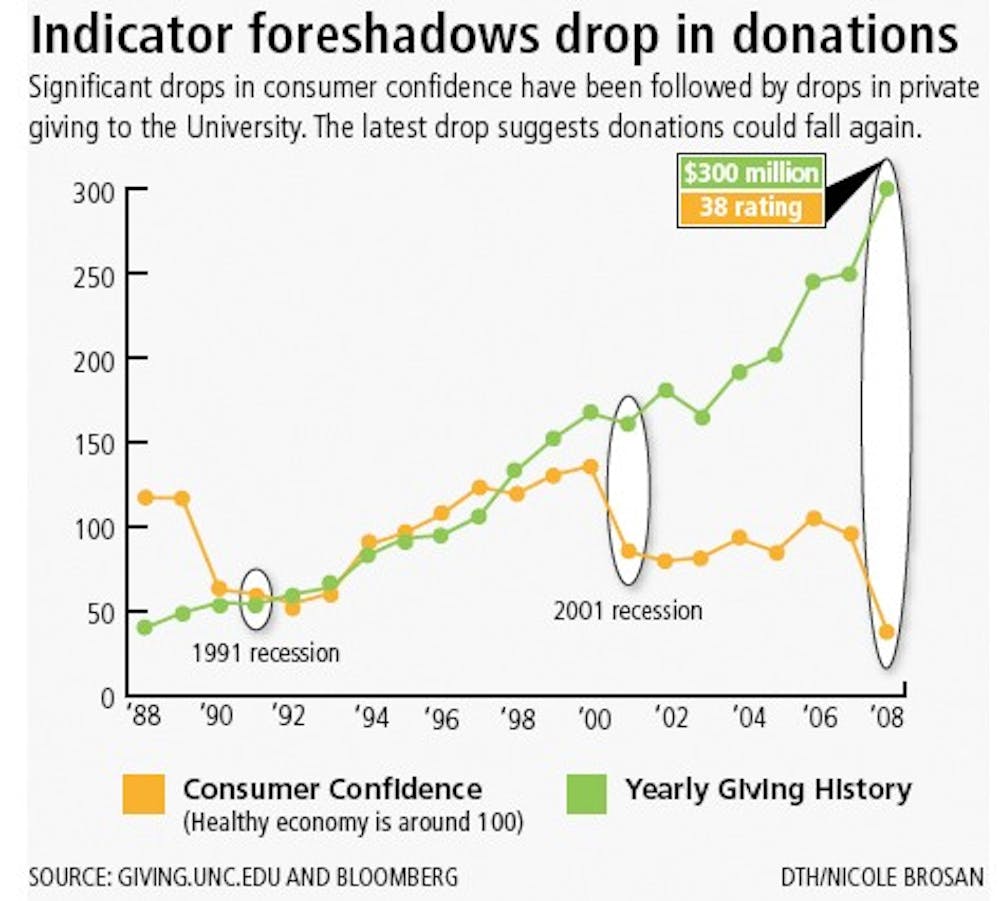Click here to view the graphic at full size.
Private giving to the University likely will suffer amid the nation's economic plunge.
""We have trouble raising money for everything in a down economy"" Chancellor Holden Thorp said Monday, as reports declared an official economic recession.
Private giving is up so far this year, but a deepening economic crisis could affect UNC's endowed professorships, scholarships, grants and other operations that rely on donations.
Private donations make up the bulk of UNC's endowment, the invested fund meant to provide a steady stream of income for scholarships, professorships, fellowships and research.
In the recessions of 1991 and 2001, UNC's private donations fell by 1.8 percent and 3.6 percent, respectively.
Those were two of only three drops in private giving since 1988, the earliest data provided by the University's development office, UNC's chief fundraising unit.
Despite the trend, development officials this year are optimistic, pointing to an 8 percent increase in private giving during the one-year period that ended Nov. 17, 2008.
But they're aware that a sour economy could make donors more conservative with their money.
We know everyone out there is a little bit nervous"" said Elizabeth Dunn, senior associate vice chancellor for development. I'm not sure anyone has been immune unless they have their money sewn to the mattress.""
Donor reticence also could throw a wrench into high-priority fundraising initiatives. Just this fall" University officials vowed to raise more private money for merit-based scholarships and floated plans for a $4 billion capital campaign.
Thorp said he remains committed to raising money for merit scholarships the crux of his effort to attract more of North Carolina's best high school graduates. He said he is encouraging donors to put their money toward that goal.
But the pending capital campaign first discussed publicly at a September Board of Trustees meeting" could take a back seat.
""We're still a long time away from organizing a campaign" Thorp said. We're certainly not because of the economy" in a rush to do that.""
The most recent campaign" Carolina First ended last December after raising $2.4 billion. The next campaign still is in its earliest planning stages: Thorp said he is recruiting for the 15- to 20-member Volunteer Leadership Planning Team which will develop a firm blueprint for campaign timing and strategies.
About 40 percent of the funds raised during the Carolina First campaign went to the endowment.
Jon King chief executive officer of the private company that manages the endowment" recently said the University's endowment has lost 13 percent of its value in the last four months. The median loss for universities nationwide was 19 percent.
""We're losing money" but we're losing less than most institutions" King said in an interview, adding that the company has funneled more of the endowment into treasury bonds, a more secure investment.
Development officials stressed that existing scholarships, professorships, grants and other privately funded obligations are secure.
But a continued downturn could make it difficult to create as many new programs, and King estimated the University could start feeling those effects next year.
Eric Ghysels, economics and finance professor at the Kenan-Flagler Business School, said the recession could be severe and prolonged.
It truly is much worse than the 2001 recession"" he said.
The consumer confidence index — a measure of what the average person thinks about the U.S. economy, both now and in the next six months — dropped in October to a record low of 38. Last October, consumer confidence was at 95.2.
The purchasing power of consumers has decreased a lot either because they lost jobs or because they don't have confidence in the future"" Ghysels said. These are economic times where lots of people feel sort of uneasy.""
The country's economic health and university donations are directly related" said Ken Sigmon" associate vice chancellor for development at N.C. State University.
""If they're feeling poor" whether they're truly poor or not" they're not going to give away their money.""
Despite grim predictions"" UNC-CH's fundraisers are optimistic.
""It's not like people are running away and saying" ‘I'm never going to give to the University again"'"" Dunn said. But many donors are giving less or delaying their payments.
""They're just buying time"" she said.
Dunn said the development office will continue to cultivate relationships with donors, even if they are giving less.
Our activity level doesn't change"" Dunn said. It may focus less on asking for gifts and more on thanking for gifts they have given previously.
""We're trying to be respectful and compassionate with our donors.""
Contact the Projects Editors at dthprojects@gmail.com.


